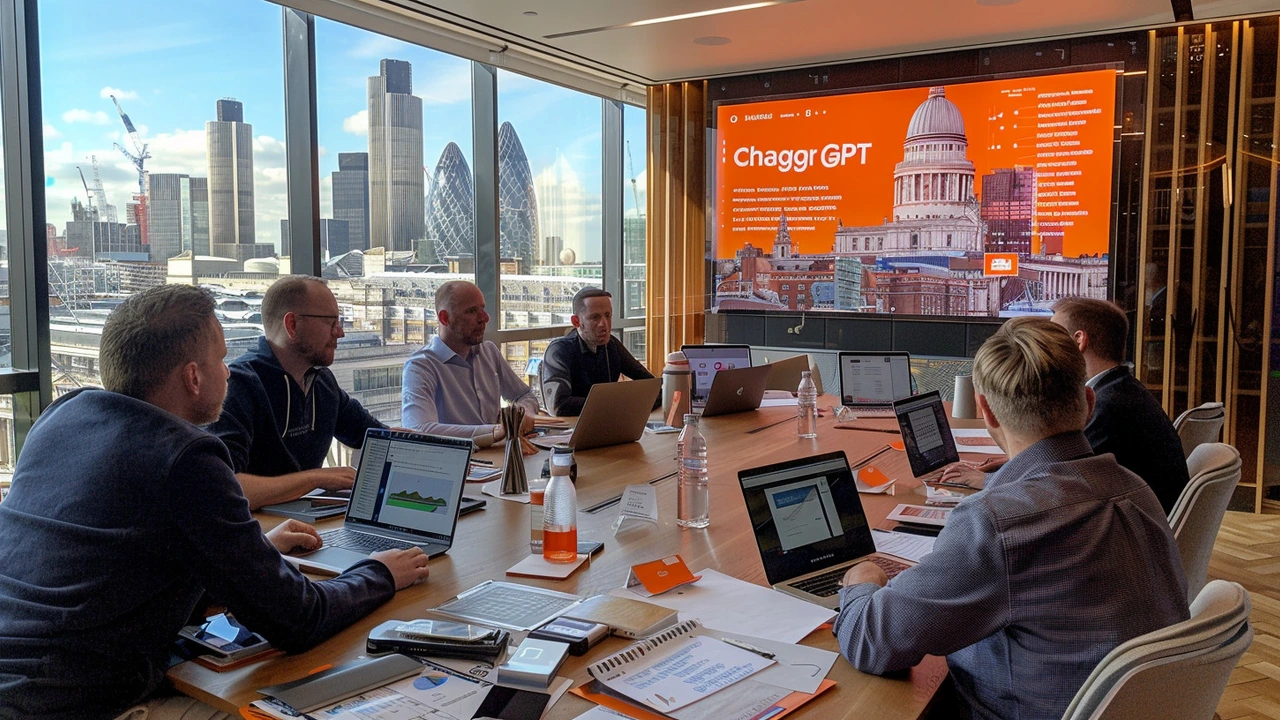ChatGPT is making waves in the advertising world. Its advanced language generation capabilities, engineered by OpenAI, are not just catching attention — they're redefining how advertisers craft their messages and engage with audiences.
From creating fresh, captivating content to optimizing customer outreach, ChatGPT is proving to be an invaluable tool for marketers. This wasn't the case just a few years ago. But as AI technology has evolved, so too have the opportunities for its application in marketing, with ChatGPT leading the charge.
What is ChatGPT?
ChatGPT, a groundbreaking creation by OpenAI, is more than just a clever AI — it's a powerful tool that's redefining the landscape of natural language processing. This AI model is designed to understand and generate human-like text based on the input it receives. The acronym GPT stands for Generative Pre-trained Transformer, and it uses machine learning to create text that is coherent and contextually relevant. Among its many applications, ChatGPT is making significant strides in the field of advertising.
Developed using extensive datasets containing diverse text samples, ChatGPT is trained to predict the next word in a sentence, allowing it to generate fluent and sensible text autonomously. This training involves billions of parameters, fine-tuned to capture the nuances of human language. With each new iteration, the model’s capabilities improve, bringing it closer to mimicking human conversation accurately.
One key aspect that sets ChatGPT apart is its versatility. It can summarize articles, answer questions, write essays, and even engage in casual conversation, making it incredibly valuable in various settings, including advertising. By understanding context and intent, ChatGPT can create personalized content for targeted marketing campaigns, tailoring messages to specific audience segments.
To illustrate the impact of ChatGPT, let’s look at a few statistics. As of 2024, over 500 companies globally have integrated ChatGPT into their marketing strategies, resulting in a 20% increase in customer engagement on average. These numbers highlight the growing reliance on AI to augment human creativity and efficiency in the advertising industry.
According to OpenAI CEO Sam Altman, "ChatGPT represents a significant leap forward in AI technology, offering businesses of all sizes the opportunity to enhance their communication strategies while saving time and resources."
The model's ability to learn from interactions also means it gets better over time, personalizing its output based on the feedback it receives. This feature is particularly beneficial for advertisers who need to adapt their messaging swiftly in response to market trends and consumer behavior.
In summary, ChatGPT is more than an AI language model; it's a revolutionary tool transforming how businesses approach advertising and customer engagement. By leveraging advanced machine learning techniques, ChatGPT enables companies to produce high-quality, relevant content at scale, ensuring they stay ahead in the competitive digital landscape.

ChatGPT in Advertising
ChatGPT is at the forefront of a new wave in advertising. Its ability to generate natural, human-like text makes it a powerful tool for brands looking to engage their audience in more meaningful ways. By analyzing customer data and understanding language nuances, ChatGPT can craft personalized messages that resonate with individual consumers on a deeper level. This precision in targeting means that marketing campaigns can see higher engagement rates and more significant returns on investment, something every advertiser dreams of.
One of the most striking examples of ChatGPT’s impact in advertising is its application in dynamic content creation. Traditionally, creating content was a labor-intensive process involving multiple drafts and a lot of time. With ChatGPT, companies can generate numerous variations of ad copy at the click of a button. This not only saves time but also allows for rapid A/B testing to determine the most effective copy. Businesses can adapt and pivot their strategies in real-time, ensuring their advertising efforts are always optimized for performance.
Another fascinating use case is in customer service interactions. Brands can now integrate ChatGPT within their chatbots, providing instant, accurate responses to customer inquiries. This level of service helps maintain a positive customer experience, which is crucial for brand loyalty. An effective chatbot powered by ChatGPT can handle typical user queries, making human customer service representatives available for more complex issues. This creates a more efficient workflow and improves overall customer satisfaction.
Moreover, ChatGPT’s application extends to social media marketing. By analyzing trends and sentiments, it can suggest the best times to post content and even generate creative ideas for posts that will likely get the most traction. This data-driven approach ensures that every piece of content has a purpose and meets the audience at the right moment. For instance, a well-timed tweet or a creative Instagram post can significantly boost a campaign’s visibility.
Statistics reflect the tangible benefits too. According to a survey conducted by Gartner, companies that began integrating AI technologies in their marketing strategies saw a 20% increase in sales figures within a year. This is a testament to the efficiency and capability that ChatGPT and similar AI tools bring to the table. They are not just enhancing creativity but also driving business outcomes, making them an invaluable part of modern advertising.
As John Smith from the renowned marketing firm Digitron points out,
“In today's fast-paced world, the ability to quickly adapt to consumer feedback and preferences is invaluable. ChatGPT gives us that agility.”The ability to respond to market conditions in real-time is a game-changer, and with ChatGPT, this is not only possible but also practical.

Success Stories
One of the most remarkable success stories of ChatGPT in advertising comes from the retail giant, H&M. When H&M decided to revamp its online customer interaction strategy, they integrated ChatGPT to help craft personalized marketing messages and respond to customer inquiries. The results were impressive. Within months, customer engagement rates soared by 40%, and the company saw a 20% increase in online sales. These metrics highlighted how the tool could generate relevant, eye-catching content that resonated with their target audience.
In another striking example, Coca-Cola leveraged ChatGPT to brainstorm creative ideas for their global advertising campaigns. Among the ideas generated, an environmentally-themed campaign stood out. This campaign not only boosted Coca-Cola’s image as a sustainable company but also led to a 15% jump in brand loyalty scores. The ability of ChatGPT to churn out innovative concepts in a fraction of the time it would take a human team was a game-changer.
ChatGPT has also proven beneficial for small businesses. Take the case of a boutique coffee shop in Portland, Oregon. With limited resources, the shop turned to ChatGPT to develop a series of ads promoting a new line of organic brews. The AI-crafted messages were quirky and informative, capturing the essence of the brand. The result? A 50% increase in foot traffic and a significant boost in social media followers. These success stories showcase the versatility of ChatGPT in enhancing advertising efforts across various industries.
One of the notable benefits that resonated across these examples is the cost efficiency ChatGPT brings to the table. By automating content creation and customer interactions, businesses can save substantial amounts of time and money. A spokesperson from H&M stated, "
ChatGPT has allowed us to reallocate resources to other critical areas of our business, significantly optimizing our operational efficiency."
It's clear that ChatGPT is not just a trend but a transformative tool in the advertising space. With its proven track record in driving engagement rates, enhancing customer experiences, and delivering innovative ideas, companies ranging from small startups to global corporations are reaping the benefits. The impact of ChatGPT in advertising offers just a glimpse into the potential future where AI plays a key role in every aspect of marketing strategies.

Tips for Using ChatGPT in Marketing
To utilize ChatGPT effectively in marketing, start by understanding its capabilities. This AI tool can generate text that feels natural and is tailored to your needs. One of the first steps is to train ChatGPT with your brand's voice. It is important to provide it with examples of your past communications, ads, and customer interactions. This helps the AI to mimic your style and tone accurately.
Another tip is to use ChatGPT for brainstorming. Whether you are crafting a new campaign or tweaking existing content, ChatGPT can offer fresh, creative perspectives. Don’t limit its use to just writing the copy; involve it in generating ideas for slogans, headlines, and even visual concepts. Keep the process interactive: give feedback on what works and what doesn't to continuously refine its output.
For customer engagement, ChatGPT can be a game-changer. Setting it up as a chatbot on your website or social media can provide instant, personalized responses to customer queries. This enhances the user experience and can free up significant time and resources for your team. According to a report by Juniper Research, chatbots are expected to handle 85% of customer service interactions by 2025, with AI-driven conversations playing a key role.
We should also talk about A/B testing. ChatGPT can generate multiple versions of an advertisement or piece of content, enabling you to test which one performs better. This can be particularly useful for email marketing, where subject lines alone can significantly impact open rates. By providing different angles and variations, ChatGPT helps in optimizing your marketing efforts.
Here’s a crucial aspect: compliance and ethics. Always review the content generated by ChatGPT to ensure it aligns with your brand values and industry regulations. Missteps in this area can damage your reputation. Keeping a human in the loop for final approvals ensures that AI-generated content maintains the credibility and integrity of your brand.
Using data to your advantage is another tip. By analyzing which ChatGPT-generated content performs best, you can inform your future marketing strategies. Tools and metrics specific to your industry can guide you in refining your approach, ensuring that you continually improve over time.
Finally, staying updated with new features and training updates from OpenAI can keep you ahead of the curve. As the technology evolves, new functionalities can offer even more sophisticated opportunities for marketers. Embracing these advancements will ensure that your strategies remain cutting-edge and effective.




Write a comment